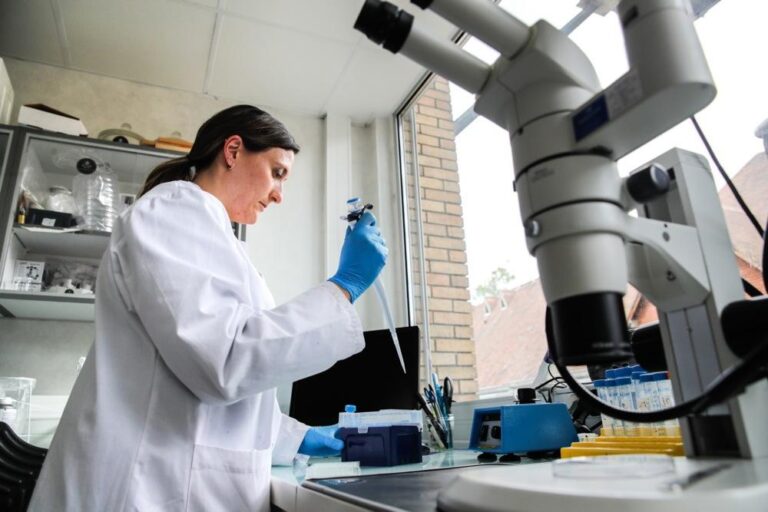In the wake of significant funding cuts to scientific research under the Trump administration, France is stepping forward to attract American researchers seeking more stable support for their work. The French government has launched a series of initiatives aimed at welcoming these displaced scientists, promising not only financial backing but also a collaborative environment that fosters innovation and excellence in research. As global competition for top talent intensifies, France’s strategy underscores its commitment to maintaining robust scientific advancements while positioning itself as a desirable alternative for those disillusioned by recent policy shifts in the United States. This article explores France’s efforts, the potential impact on the scientific community, and the broader implications for international research collaboration.
Attracting Global Talent: France’s Strategic Initiatives to Welcome Researchers
In a bid to capitalize on the talent pool displaced by reduced funding in the U.S., France is launching several strategic initiatives to attract international researchers. The National Centre for Scientific Research (CNRS) and the Ministry of Higher Education, Research and Innovation are at the forefront of these efforts, providing enticing incentives such as streamlined visa processes, competitive funding opportunities, and support for integration into the French research ecosystem. This welcoming approach aims not only to fill critical gaps within academic institutions but also to foster a diverse intellectual environment that can drive innovation.
To further enhance the appeal of France as a research destination, the government is implementing multi-faceted programs that include:
- Research Grants: Substantial funding aimed at specific fields, including artificial intelligence and climate sciences.
- Networking Opportunities: Platforms for international researchers to connect with local institutions, facilitating collaborative projects.
- Language Support: Programs designed to assist researchers in mastering French, easing their transition both professionally and socially.
| Initiative | Description |
|---|---|
| Fast-Track Visa | Expedited processing for researchers and their families. |
| Funding Packages | Diverse grants to support innovative research projects. |
| Cultural Events | Integration programs featuring local culture and traditions. |
Government Support and Funding: Incentives for Scientists Leaving the U.S
As scientists express concerns over funding cuts and diminishing research opportunities in the United States, the French government is stepping in with a series of enticing initiatives. Aimed at attracting top-tier researchers, these measures include:
- Research Grants: Substantial grants to support innovative research projects across various fields.
- Relocation Packages: Financial assistance for moving expenses, easing the transition for scientists and their families.
- Tax Incentives: Favorable tax conditions for foreign researchers establishing themselves in France.
- Research Institutions Partnership: Opportunities to collaborate with prestigious French academic institutions, enhancing career prospects.
The government has also established a streamlined visa process to expedite entry for international scholars, allowing them to focus on their work rather than bureaucratic hurdles. Additionally, a dedicated advisory board has been formed to help incoming researchers navigate the French scientific community and address any challenges they may encounter. This proactive approach not only amplifies France’s reputation as a global research hub but also signifies a strategic move to retain and enhance scientific expertise within its borders.
| Incentive | Description |
|---|---|
| Research Grants | Fund innovative projects in various scientific fields. |
| Relocation Packages | Cover moving expenses for scientists and families. |
| Tax Incentives | Provide favorable tax conditions for foreign researchers. |
| Collaboration Opportunities | Partner with leading French institutions for enhanced research. |
Cultural and Scientific Appeal: Why France is the Destination of Choice
France has long been at the forefront of cultural and scientific advancement, making it an alluring destination for researchers looking for a fresh start amidst political uncertainty. With an array of world-class universities and innovative research institutions, France cultivates an environment that thrives on creativity and collaboration. Key attractions include:
- Diverse Research Opportunities: From technology to environmental science, France offers a wide range of fields with ample funding for groundbreaking projects.
- Strong Government Incentives: The French government is actively funding research initiatives to attract global talent, including tax incentives for businesses that invest in R&D.
- Rich Academic Heritage: Hosting institutions like the Sorbonne and CNRS, France retains a legacy in education and research that continues to draw scholars worldwide.
Additionally, the unique cultural experience that comes with living in France enhances its appeal. Researchers can immerse themselves in a vibrant arts scene while also benefiting from the country’s prestigious scientific conferences. A quick overview of France’s offerings includes:
| Factor | Details |
|---|---|
| International Collaboration | Engage with global networks for shared research goals |
| Cultural Experience | Explore historic landmarks, cuisine, and arts |
| Language Programs | Opportunities to learn French for better integration |
The Future of Innovation: Long-term Implications for Research Collaboration and Growth
France’s strategic initiative to attract researchers disillusioned by the reductions in funding and support in the United States represents a pivotal shift in global research dynamics. By offering incentives such as competitive salaries, state-of-the-art facilities, and collaborative projects with leading institutions, France aims to establish itself as a hub for scientific inquiry. The country’s emphasis on multilingual environments and fostering a culturally rich atmosphere uniquely positions it as a welcoming destination for the diverse talent pool now seeking opportunities abroad. Furthermore, these efforts may catalyze a long-term transformation in how research collaboration is perceived, encouraging more countries to adopt inclusive policies that prioritize innovation over isolationism.
As France enhances its appeal to top talent, the broader implications for global research networks could be considerable. Enhanced collaboration between French institutions and international researchers may lead to breakthroughs in various fields such as renewable energy, health technologies, and artificial intelligence. This trend could facilitate the emergence of new partnerships, encompassing a range of stakeholders including universities, government agencies, and private sector entities, ultimately contributing to economic growth. Moreover, as research landscapes shift, countries must recognize the importance of investment in education and supportive infrastructures, as illustrated in the table below:
| Focus Area | Implication for Growth |
|---|---|
| Financial Incentives | Attracts talent, fosters innovation |
| International Collaboration | Enhances knowledge exchange |
| Research Facilities | Promotes high-quality research output |
| Policy Support | Encourages sustainable research environments |
The Conclusion
In conclusion, France’s proactive initiatives to attract researchers disillusioned by the funding cuts and policy changes under the Trump administration underscore the nation’s commitment to fostering innovation and scientific collaboration. By enhancing research grants and creating a welcoming environment for international talent, France positions itself as a global leader in scientific advancement. As the landscape of academic research continues to evolve, the efforts of the French government may not only benefit the researchers seeking new opportunities but could also significantly enrich the country’s intellectual capital and technological progress. The implications of these efforts will be closely watched as the world navigates the challenges of research funding and international collaboration in the coming years.




